Tomorrow, Tomorrow, Insha-Allah
A true story by Sara Cheikh
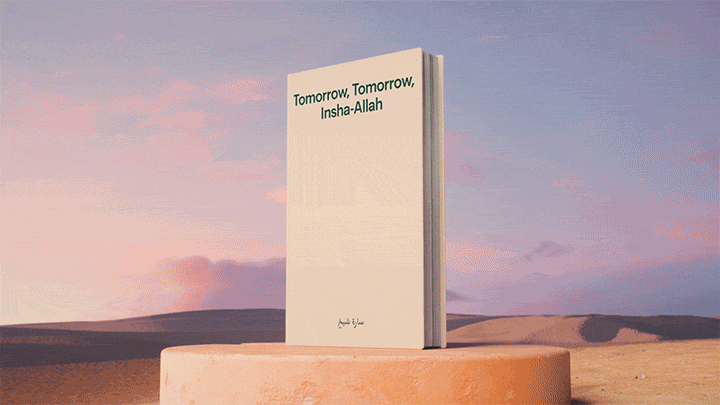
Out now!
The story told in the book gets complemented by this audiovisual online archive.
THE WAIT
Chapter 02ONE MONTH
IN MHEIRIZ
Chapter 03THE WAIT
[ENG] In the camps, families build their own mudbrick houses. They are usually small rooms, no bigger than 15 m². The room that my parents built and where I lived until I was six years old is still standing but only has one wall, while the roof has long since fallen in.
[ESP] En los campamentos, las familias construyen sus propias casas de adobe. Suelen ser habitaciones pequeñas de no más de 15 m². La habitación de adobe que construyeron mis padres y en la que viví hasta los seis años todavía está en pie, pero ahora solo tiene un muro. El techo hace mucho que se cayó.
[ESP] En los campamentos, las familias construyen sus propias casas de adobe. Suelen ser habitaciones pequeñas de no más de 15 m². La habitación de adobe que construyeron mis padres y en la que viví hasta los seis años todavía está en pie, pero ahora solo tiene un muro. El techo hace mucho que se cayó.
Extract from the book / Extracto del libro
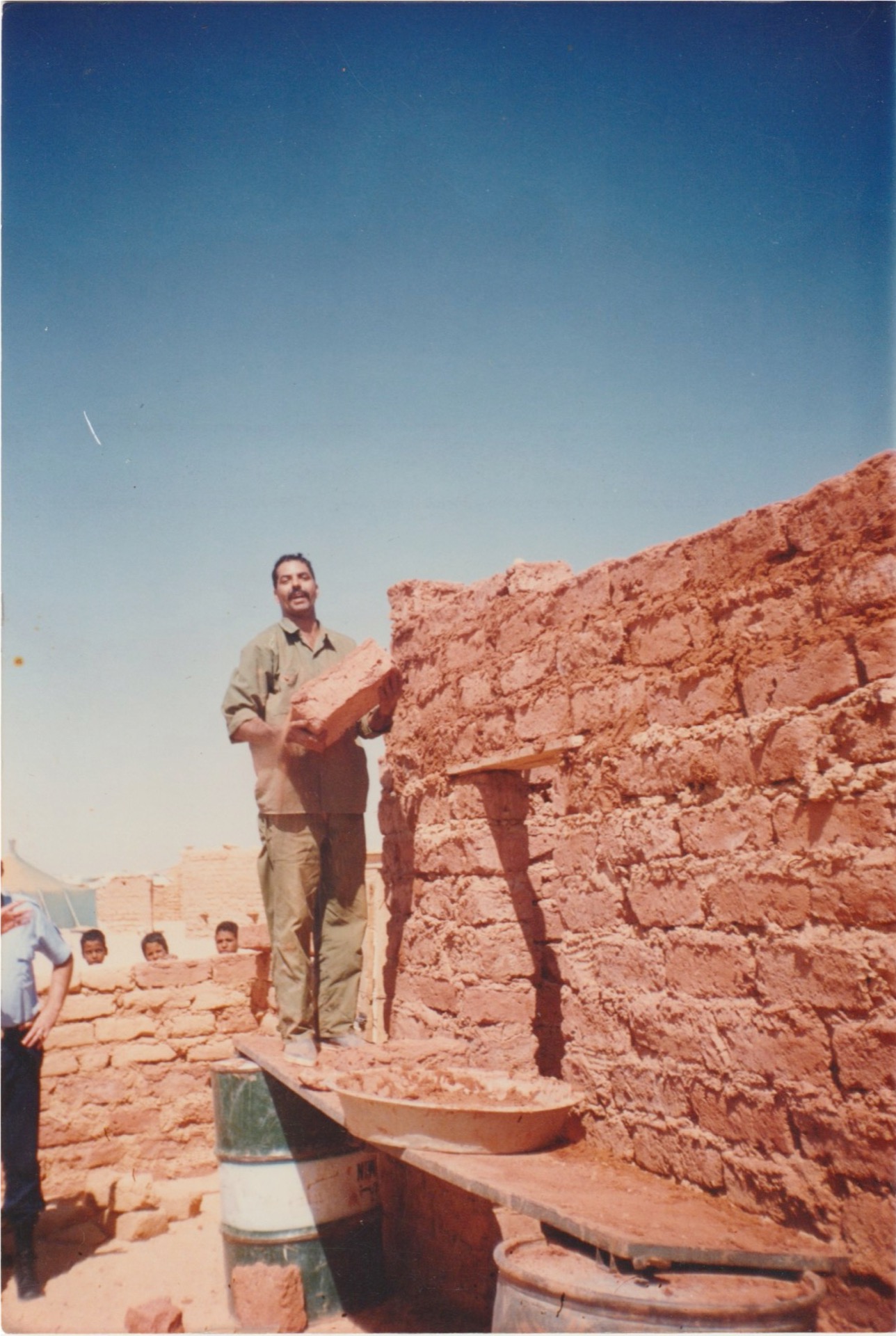
My dad building our mud-brick house. Smara camp in Tindouf, Algeria, 1992.

My parents a few days before finishing the construction of the house. Smara camp in Tindouf, Algeria, 1992

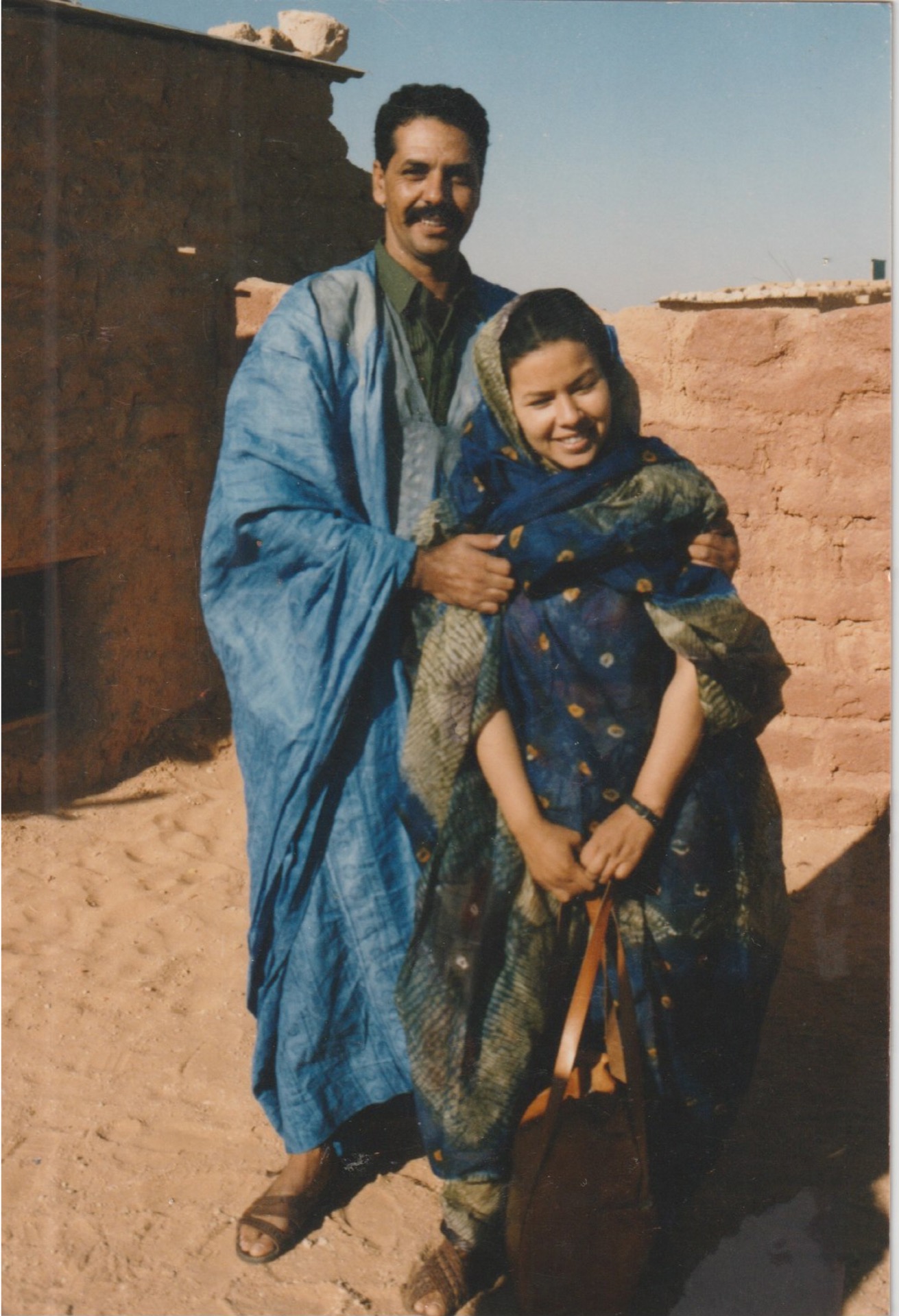
From left to right: my father, my mother, my aunt Nayla and my aunt Nayat on the lawn of Noa's house. Smara camp in Tindouf, Algeria, 1992
[ENG] On the way back, I see a boy and girl around five years old, holding hands. They are about 10 m ahead of us. The boy has a black bag with three loaves of bread. Both are barefoot and have shaved heads. I have a flashback to me and my twin, Nayat, going to the marsa to get bread, barefooted, with shaved heads, probably fighting over who got to carry the bag.
It takes us about ten minutes to walk home through the souk. In forty-five years of forced exile, the Smara camp has gone from having just one market stall, where you could find meat and bread, to having a supermarket they have dubbed Carrefour.
[ESP] En el camino de vuelta, veo a un niño y una niña de unos cuatro o cinco años cogidos de la mano. Están a unos 10 m delante de nosotros. El niño tiene una bolsa negra con tres panes, los dos van descalzos y tienen la cabeza rapada. Tengo un flashback de mí y mi gemela Nayat yendo al marsa a por pan, descalzas, con la cabeza rapada y, probablemente, peleándonos por quién cargaba con la bolsa.
Tardamos unos diez minutos en atravesar el zoco para volver a casa. En cuarenta y cinco años de exilio forzado, el campamento de Smara ha pasado de tener un único puesto en el mercado, en el que solo se podía encontrar carne y pan, a contar con un supermercado al que han llamado, los muy cachondos, Carrefour.
It takes us about ten minutes to walk home through the souk. In forty-five years of forced exile, the Smara camp has gone from having just one market stall, where you could find meat and bread, to having a supermarket they have dubbed Carrefour.
[ESP] En el camino de vuelta, veo a un niño y una niña de unos cuatro o cinco años cogidos de la mano. Están a unos 10 m delante de nosotros. El niño tiene una bolsa negra con tres panes, los dos van descalzos y tienen la cabeza rapada. Tengo un flashback de mí y mi gemela Nayat yendo al marsa a por pan, descalzas, con la cabeza rapada y, probablemente, peleándonos por quién cargaba con la bolsa.
Tardamos unos diez minutos en atravesar el zoco para volver a casa. En cuarenta y cinco años de exilio forzado, el campamento de Smara ha pasado de tener un único puesto en el mercado, en el que solo se podía encontrar carne y pan, a contar con un supermercado al que han llamado, los muy cachondos, Carrefour.
Extract from the book / Extracto del libro
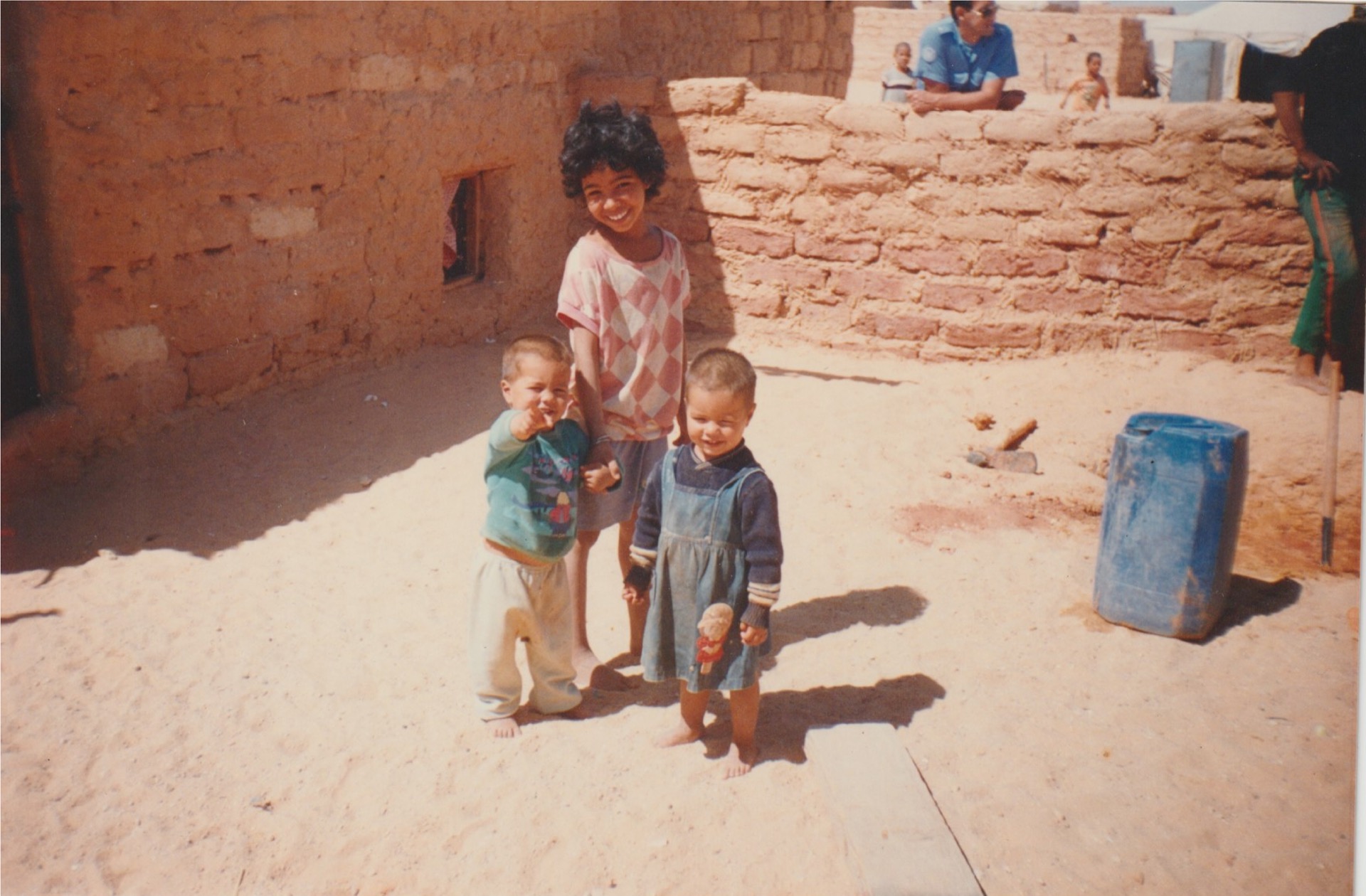 My cousin Munana holding my hand with my sister Nayat in the courtyard of my aunt Nayat's house at the time when we would fight to carry the bread bag. Smara camp in Tindouf, Algeria, 1994.
My cousin Munana holding my hand with my sister Nayat in the courtyard of my aunt Nayat's house at the time when we would fight to carry the bread bag. Smara camp in Tindouf, Algeria, 1994.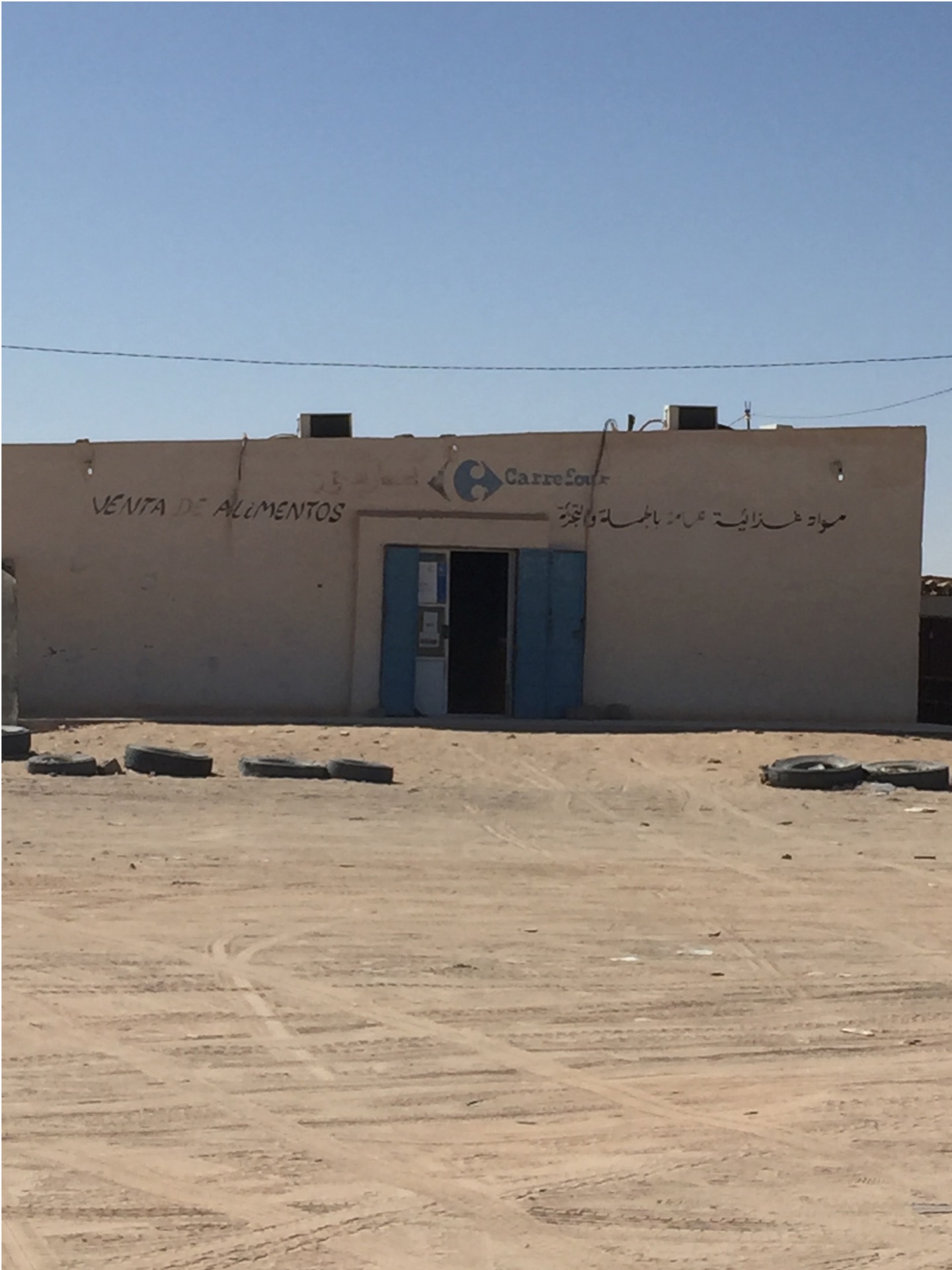
Grocery store in the market. Smara camp in Tindouf, Algeria, March 2020.
My cousin Bani building and destroying his domino tower. Camp Smara in Tindouf, Algeria. March 2020.
Beiba making tea in my aunt Nayat's living room.
Smara camp in Tindouf, Algeria, March 2020.

My cousins Fadila (grey melhfa) and Beiba talking in front of my aunt Nayat's tent. Smara camp in Tindouf, Algeria, March 2020.
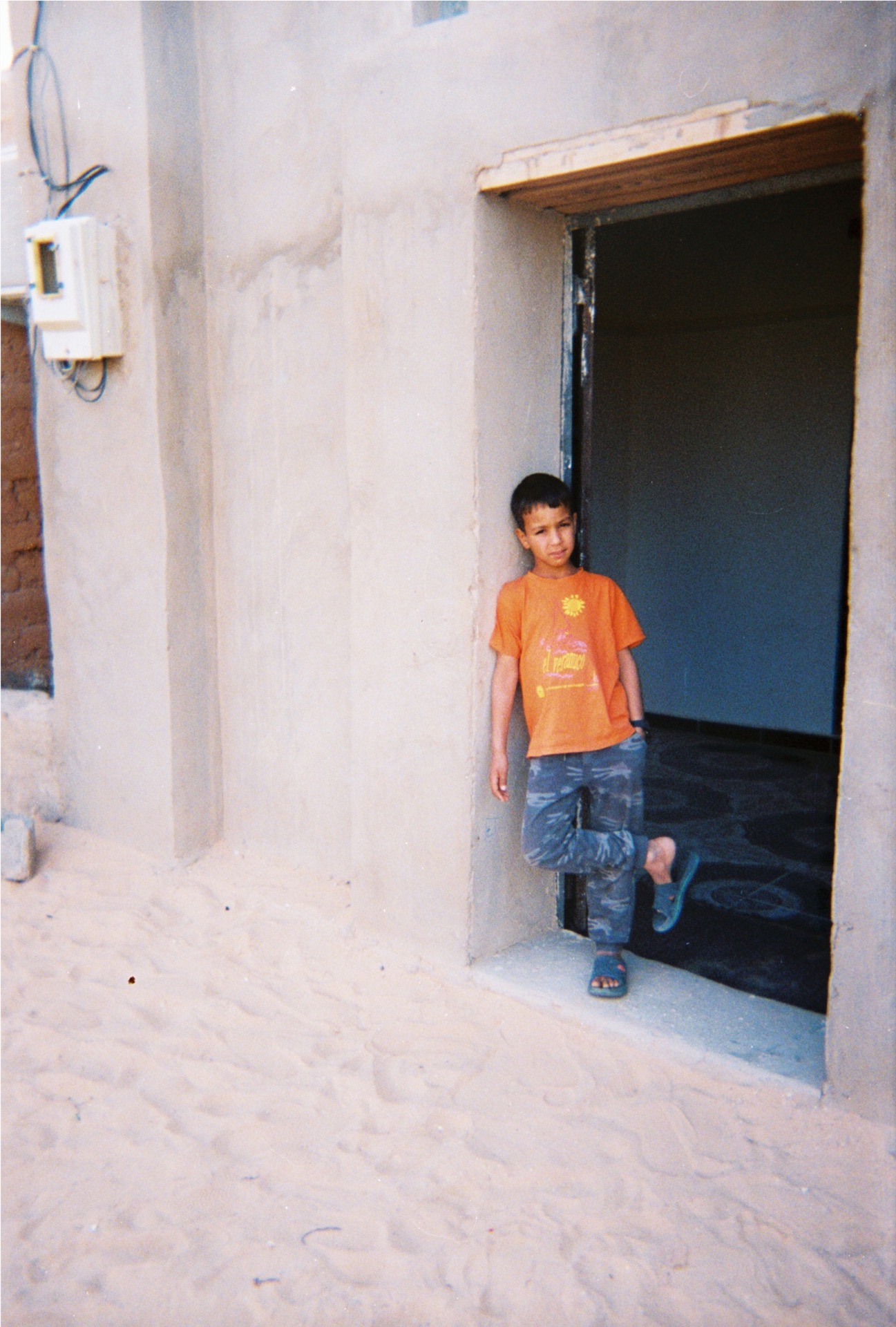
My cousin Bani in front of his living room after our soccer match with Ahmed. Smara camp in Tindouf, Algeria, March 2020.

 Some sand bricks that we used to build houses in the refugee camps with the "Wall of Sand" project. Boujdour camp in Tindouf, Algeria, 2015.
Some sand bricks that we used to build houses in the refugee camps with the "Wall of Sand" project. Boujdour camp in Tindouf, Algeria, 2015. Nana, for whom we built an adobe room with Wall of Sand, in front of her tent. Boujdour camp in Tindouf, Algeria, 2015.
Nana, for whom we built an adobe room with Wall of Sand, in front of her tent. Boujdour camp in Tindouf, Algeria, 2015.

Left: My cousin Fadila photographing the stars in front of her house. Smara camp in Tindouf, Algeria, March 2020. Right: Fadila in front of the ruins of the house my parents built that is 10m from hers. Smara camp in Tindouf, Algeria, March 2020.
[ENG] At the border checkpoint, there are about ten Algerian soldiers, all wearing masks. It still shocks me to see people wearing masks in the desert. When it's our turn to hand over the documentation to cross the border, my mother gives me my Saharawi ID card to show to the Algerian soldiers. She has given me my twin sister’s card. After twenty-eight years, she still can't tell us apart.
My mother has a British car with right-hand drive. A red-haired, green-eyed, pale-skinned Algerian soldier approaches the passenger window, where my mother sits and is surprised not to see the steering wheel; he realises that the driver is on the right and moves around the car.
"I thought it was strange that a woman would drive a good looking 4x4 like that," says the soldier.
My mother stretches her head towards the driver's window to answer him.
"This woman owns this car and drives it whenever she wants.
[ESP] En el puesto de control fronterizo hay unos diez soldados argelinos, todos con mascarilla. Me choca ver gente con tapabocas en el desierto. Llega nuestro turno para enseñar la documentación antes de cruzar la frontera y mi madre me da mi DNI saharaui para que se lo enseñe a los soldados argelinos. No es mi carné, sino el de mi gemela. La señora lleva veintiocho años sin diferenciar a sus hijas.
Mi madre tiene un coche británico en el que el conductor está a la derecha. El soldado argelino, pelirrojo, con los ojos verdes y la piel pálida, se acerca a la ventanilla del copiloto donde está mi madre y se sorprende al no ver el volante; se da cuenta de que el conductor está a la derecha y rodea el coche.
—Ya me parecía raro que una mujer condujera un 4x4 así de moderno —suelta el muy imbécil.
Mi madre extiende la cabeza hacia la ventanilla del conductor para contestarle:
—Esta mujer es su dueña y lo conduce cuando le da gana.
My mother has a British car with right-hand drive. A red-haired, green-eyed, pale-skinned Algerian soldier approaches the passenger window, where my mother sits and is surprised not to see the steering wheel; he realises that the driver is on the right and moves around the car.
"I thought it was strange that a woman would drive a good looking 4x4 like that," says the soldier.
My mother stretches her head towards the driver's window to answer him.
"This woman owns this car and drives it whenever she wants.
[ESP] En el puesto de control fronterizo hay unos diez soldados argelinos, todos con mascarilla. Me choca ver gente con tapabocas en el desierto. Llega nuestro turno para enseñar la documentación antes de cruzar la frontera y mi madre me da mi DNI saharaui para que se lo enseñe a los soldados argelinos. No es mi carné, sino el de mi gemela. La señora lleva veintiocho años sin diferenciar a sus hijas.
Mi madre tiene un coche británico en el que el conductor está a la derecha. El soldado argelino, pelirrojo, con los ojos verdes y la piel pálida, se acerca a la ventanilla del copiloto donde está mi madre y se sorprende al no ver el volante; se da cuenta de que el conductor está a la derecha y rodea el coche.
—Ya me parecía raro que una mujer condujera un 4x4 así de moderno —suelta el muy imbécil.
Mi madre extiende la cabeza hacia la ventanilla del conductor para contestarle:
—Esta mujer es su dueña y lo conduce cuando le da gana.
Extract from the book / Extracto del libro
 Malik (white pants) before resuming our second day of travel to Mheiriz. Bir Lehlu, liberated territories of Western Sahara, March 2020.
Malik (white pants) before resuming our second day of travel to Mheiriz. Bir Lehlu, liberated territories of Western Sahara, March 2020. Three men at the market moments before going to Mheiriz. Bir Lehlu, liberated territories of Western Sahara, marzo 2020.
Three men at the market moments before going to Mheiriz. Bir Lehlu, liberated territories of Western Sahara, marzo 2020.